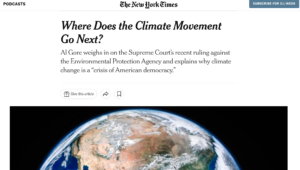https://www.nytimes.com/2022/07/01/podcasts/epa-climate-al-gore.html?smid=tw-share
By Lauren Jackson
July 1, 2022
This week, in one of the most important environmental rulings ever, the Supreme Court made it more difficult for America to meet its climate goals. Yesterday’s decision limits the Environmental Protection Agency’s ability to regulate carbon emissions from power plants — which, as we covered on The Daily, is a blow to the Biden administration’s commitments to reduce emissions by 2030.
So, we wanted to ask Mr. Gore: Where does the climate movement go next?
This interview has been lightly edited for clarity and brevity.
NTY Question: The Supreme Court just ruled against the Environmental Protection Agency’s regulatory power, making it harder for the U.S. to meet its climate commitments by 2030. What should be done now to ensure federal progress on emissions reduction?
Gore: While this ruling curtails some of the E.P.A.’s authority, it does not mean we are out of options to address the climate crisis. There is more we can — and must — do. It is more important than ever for Congress to take action on this issue.
In light of the ruling, where should the energy of the climate movement be focused next?
Gore: We need to encourage state and local governments to redouble their efforts to reduce emissions, and we also need to see the private sector step up and match their climate pledges with action. They played a critical role in advancing progress on the climate crisis when action was stalled under the previous administration.
This decade is critical for climate action and we need all hands on deck to address this crisis. That means calling on Congress to pass ambitious climate legislation this summer. It also means we need to make sure that anyone who is frustrated with the slow pace of climate action gets out to vote in this year’s midterm election.
…
Gore: The United States and every other country around the world has reached a critical inflection point on the climate crisis, which certainly raises the risk of backsliding, though I believe history will view this as an accelerant on our transition away from fossil fuels.
This is a war enabled by our continued dependence on fossil fuels. The unfortunate reality of the market for these global commodities is that despite embargoes on Russian oil and gas (which I strongly support), Putin will continue to profit from our global addiction to these sources of energy. It is only by reducing the market for these products that we will be able to undermine his power. We need more solar and wind and electric vehicles and everything else that will enable us to get off fossil fuels for good.
This should be a moment of global epiphany, not moral cowardice. It is clear that our reliance on fossil fuels poses a significant and ongoing threat to democracy around the world. We must embrace the shift away from fossil fuels and refuse to allow democracy to be held hostage by petrostates like Russia.
…
It has been clear for quite some time that capitalism as we know it is in significant need of reform. We have a lot of work to do to harness capitalism as a vehicle for a just transition. This is true here in America, where systemic racism has fueled environmental injustice and economic inequality for generations. It’s also true internationally, with developing nations that have contributed the least to the climate crisis suffering its worst impacts.
…
NYT Question to Gore: The climate crisis can feel sprawling and intractable. How do you make the crisis feel accessible — and actionable — to the general public?
Al Gore: This is such an important question because more and more people are feeling a sense of climate despair and anxiety as the crisis worsens. Despair can be just as powerful a force against climate action as denial has been.
The most important way to empower people on this issue is to give them hope. The climate crisis may feel intractable, but it is not impossible to solve.
#
.@AlGore has been lying about climate for 33 years.
He keeps the hot air coming but the climate agenda is dead, dead, dead.
All we need do now is box it up and send it to hell where it belongs.https://t.co/4AQ2ihHzpJ
— Steve Milloy (@JunkScience) July 3, 2022



